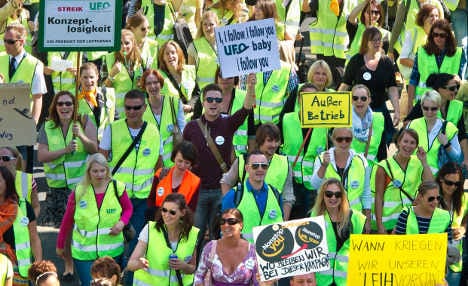“It is a bitter day when more than 1,000 flights have to be cancelled,” said Lufthansa spokesman Klaus Walther.
It was obviously only after the initial strikes last week and this Tuesday were taken nationwide on Friday, affecting at least 100,000 people, that UFO managed to force Lufthansa to the negotiating table, the Frankfurter Rundschau newspaper reported.
“A meeting of top representatives is planned for today,” said UFO chairman Nicoley Baublies at Friday lunchtime.
Although Lufthansa did not confirm the news, neither was there a denial.
Baublies said Friday evening would see pre-talks to find a way in which constructive dialogue could be entered into, as well as to enable each side to outline what they would not compromise on. He said the union was ready to use the services of a mediator.
“It is like partner therapy – we are damned to come together,” he said on state broadcaster ZDF on Friday morning.
Birgit Weinreich, a member of UFO’s negotiating commission, said the evening meeting would not involve more than about ten people.
Cabin crews will return to work as normal as of midnight on Friday, and no further strikes are planned, said Baublies. “In the next two days it is all about talks,” he said.
Lufthansa could now have a break in which managers could consider their positions, a UFO spokesman said.
Deutsche Bahn on Friday said it had laid on all the trains it had – but that the thousands of would-be Lufthansa passengers transferring to rail would add to what was in any case a busy day. “It will certainly be somewhat friendly in the trains,” said Walther.
Lufthansa competitor Air Berlin flew six additional connections and in 16 cases increased capacity on existing flights by using larger planes on Friday to mop up stranded Lufthansa customers.
DPA/The Local/hc



 Please whitelist us to continue reading.
Please whitelist us to continue reading.
Member comments